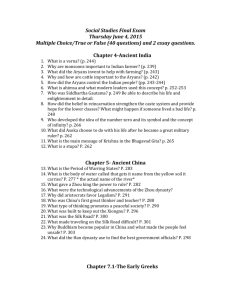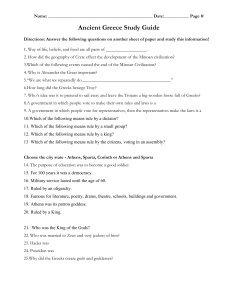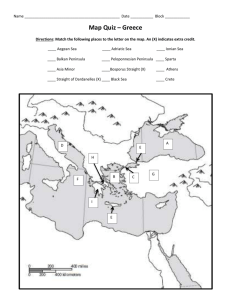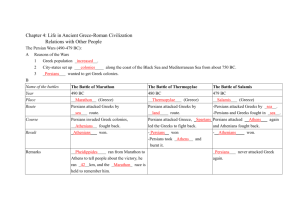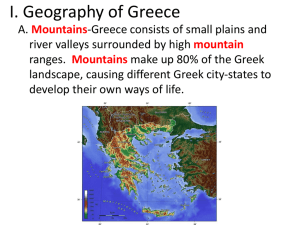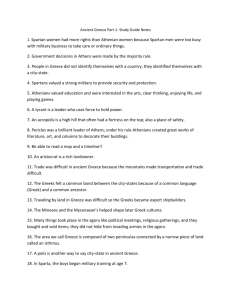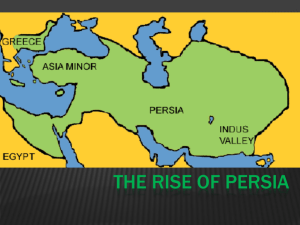Chapter 3 - FBCAworldhistory
advertisement
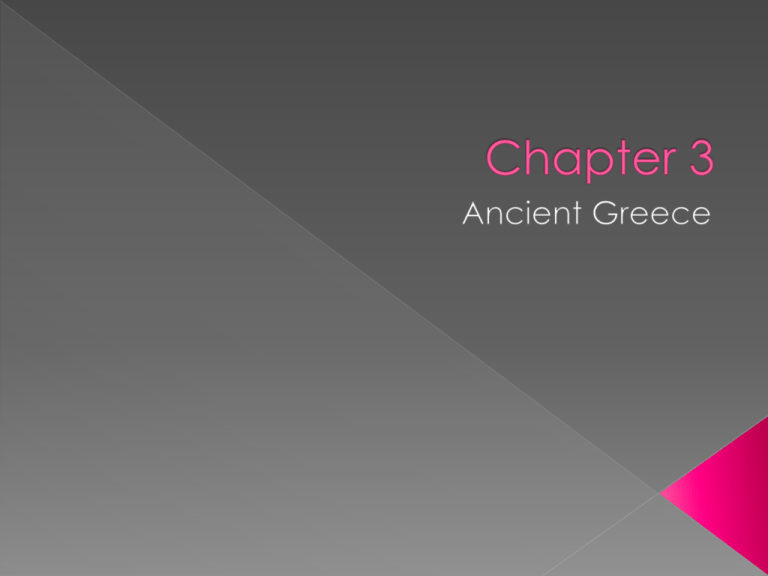
Minoan › Crete – 2000 BC › Island › Trade and › › › › colonization with Fertile Crescent Olive oil Pottery Ancestors of Philistines? Knossos, capital city – destroyed in 1400 BC Mycenae › Mainland of Greece › Adopted art, architecture, and commercial practices from Minoans. › 1400 BC became leading center of Aegean region. › Military fervor › 1200 BC conquered by Dorians. Western coast of Asia Minor Hellespont – strait separating Asia Minor from Europe. Linked the land of the Fertile Crescent with the sea trade of the Aegean world. Myceneans attacked them. Ten-year siege. Troy falls. Sneak attack with Trojan horse. Read Trojan War inset p. 56 1150-750 BC New intruders Neglected palace fortresses for simple life in villages Blended cultures into a common Greek culture. The Homeric Age Homer’s epic poems › Iliad › Odyssey Myths (stories) explain their beliefs about life, the world, and God. Mount Olympus Zeus Apollo Athena Poseidon Polytheism – › Worship of many gods Monotheism – › worship of one god › Greek gods were anthropomorphic (had › › › › › human characteristics) Had immortality and extraordinary powers Invented by men, exhibited human sins Games were held in honor of Zeus every 4 years on Mount Olympus. Ultimate Goal of the Greeks – to attain physical perfection The games were a rare demonstration of cooperation between the Greeks. The mountains of Greece tended to isolate the Greek city-states and hindered their national unity. They built their cities at the foot of a hill with a fortress at the top. They called their city a “polis,” and the fortress an “acropolis.” (acro = high) The polis was the basic political unit of Greece. However, it acted like a nation. The ancient Greek’s ultimate source of authority was his polis. Greek city-states experienced 4 basic forms of government. › Monarchy – rule by one › Oligarchy – rule by a few › Tyranny – government had complete control › Democracy – rule by the people Greek City-State Period – 750-500 B.C. Two opposing political systems and poleis › Sparta in southern Greece on the Peloponnesus › Athens – to the northeast on the mainland Conquered by Dorians who enslaved the Helots who were numerous. Dorians created a militaristic state in response to fear of uprising of the majority. Sparta developed a warrior culture. Spartan elders controlled all aspects of the lives of the people. Boys left their mothers at the age of 7 and were placed in army barracks and began their warrior training. They were beaten to learn to be tough. They were starved to learn to be tough. The weak were culled from the pack and eliminated. They were encouraged to steal to prove their resourcefulness. At the age of 20 they became part of the army. At age 30, if they had proved their worthiness, they could become citizens of Sparta. They lived in the army camp and were prepared to fight at all times. Spartan girls were trained to be mothers of warriors They also learned to be self-disciplined and tough. Spartan mothers expected their sons to “return with their shields or on them.” Every aspect of their lives were determined from furniture to food. Sparta was an oligarchy. It was ruled by a five elders who guarded against change. They forced the status quo (existing state of affairs). Sparta often forced oligarchy on neighboring city-states and organized them into the Peloponnesian League to guard against the democracy of the Athenians. Sparta was associated with militarism, isolation, oligarchy, and glorification of the state. Athens nurtured creativity, commercial endeavors, democracy, and individualism. Athenians loved beauty, art, and learning. Athens was a monarchy during the Homeric Age. Later the nobles took over and produced an oligarchy with a chief magistrate called an archon. Under the statesman Solon, Athens moved toward democracy in 594 B.C. when he gave representation to all sections of Athens in the Council of Four Hundred. In the 5th century B.C. under Pericles, Athens established a “rule of the people.” At the beginning of the 5th century B.C. the Persians advanced across Asia Minor and into Greece. The Athenians, valuing their independence, rebelled and overthrew the Persians. King Darius of Persia crushed the revolt and landed a Persian force at the Bay of Marathon (490 B.C.). The outnumbered Athenians met them and surprisingly defeated the Persians. (Read Herodotus’ quote on p. 63) Darius made plans to invade Greece in revenge but died before he could carry them out. His son, Xerxes (husband of Esther), followed through on the assault on Greece in 480 B.C. As the Persians advanced, the Greeks disagreed on their strategy. The Spartans wanted to defend the Peloponnesus; the Athenians wanted to defend the mainland. They finally agreed to take a stand at the mountain pass of Thermopylae. At Thermopylae about 7000 Greeks faced a Persian army numbering at least 200,000. The Persians attacked several times but could not take the pass. Alas, the Greeks were betrayed by one of their own who showed the Persians a secret pass through the mountains. All the Greeks except for 300 Spartans retreated. The 300, led by Leonidas, stayed to hold the pass and give the others a chance. Leonidas and his 300 Spartans fought to the death defending the pass. The Persians pressed on to Athens and destroyed it by fire; the Athenians fled in retreat to the isle of Salamis, just off the coast. Thermistocles devised a trap for the Persians. He sent a slave to report to the Persians that the Greeks were afraid and were sailing northward and that if the Persians sent their navy in at dawn they could catch the Greeks in retreat. Unwittingly, the Persians came into the Bay of Salamis as the tide was going out. Their ships were stranded, and the Greeks destroyed them. The Greeks beat back the Persians and preserved their independence. The Greek victory gave the Greek people pride, self-confidence, and patriotism. Under Pericles, Athens’ advances in thought, art, science, literature, drama, and architecture were unparalleled anywhere in the ancient world. Under Pericles, every adult male could vote and participate in government. Note that the women, slaves, and foreigners (about 90% of the population) were still excluded. 431-404 B.C. Athens versus Sparta Athens – naval strength Sparta – strong land army A plague weakened Athens and Sparta dominated, returning Athens to a state of oligarchy and tyranny.


